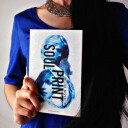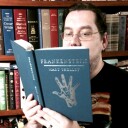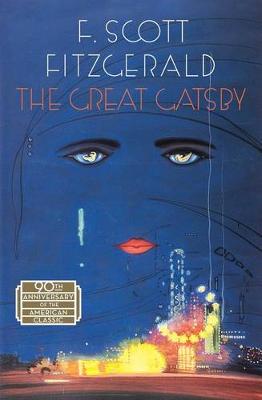
A true classic of twentieth-century literature, this edition has been updated by Fitzgerald scholar James L.W. West III to include the author's final revisions and features a note on the composition and text, a personal foreword by Fitzgerald's granddaughter, Eleanor Lanahan--and a new introduction by two-time National Book Award winner Jesmyn Ward.
Nominated as one of America's best-loved novels by PBS's The Great American Read.
The Great Gatsby, F. Scott Fitzgerald's third book, stands as the supreme achievement of his career. First published in 1925, this quintessential novel of the Jazz Age has been acclaimed by generations of readers. The story of the mysteriously wealthy Jay Gatsby and his love for the beautiful Daisy Buchanan, of lavish parties on Long Island at a time when The New York Times noted "gin was the national drink and sex the national obsession," it is an exquisitely crafted tale of America in the 1920s.
- ISBN10 0743273567
- ISBN13 9780743273565
- Publish Date 1 October 2004 (first published 14 July 1905)
- Publish Status Active
- Publish Country US
- Publisher Simon & Schuster Ltd
- Imprint Scribner
- Format Paperback
- Pages 180
- Language English
Reviews


Joséphine
Initial thoughts: For some reason I expected to be enamoured by The Great Gatsby. I wasn't. On one level I found it rather simplistic in a way that causes people to read too much into things. Like that joke about a literature teacher's interpretation of a blue curtain when the author really meant nothing by it. On the other hand, there were subtleties in the story that perhaps not everyone picks up on on their first read — such as Nick Carraway deviating sexuality. I say deviating because anything other than heterosexuality was against the social norms as well as the law in the 1920s.
What didn't sit well with me was the disconnect from the characters. As significant as some of them might have been, they were pushed into the background, left to become the backdrop to Nick's fascination with Gatsby. Perhaps it was precisely because Nick wasn't just a narrator to Gatsby's life but a biased narrator very much part of the action, such that he had little to elaborate about the others beyond their relations to Gatsby.

ammaarah
Here's my random thoughts about it...
The Great Gatsby is set in the "Roaring Twenties." I loved the way the setting of this book, helped to further the plot and idea of it. West Egg, East Egg and The Valley of Ashes all had a part to play in showing the social behavior of different types of people during that era. In History, we were learning about America during the 1920's. I felt as though this deepened my love for the book as a whole. This book also takes an amazingly critical look at what the concept of the American Dream is all about.
Each character in this novel has a role to play. Nick is our unbiased, third wheeling narrator. Tom and Daisy Buchanan along with Jordan Baker are the careless products of wealth. Jay Gatsby, the person who this book is named after and the main character of this novel, is full of hope and ambition in his quest for the American Dream and his undying love.
Every thing in this book is so profound. Every item symbolizes something, every colour means something and every word hides something deeper under its surface.
I honestly feel that this book would not have been given a four star rating if it wasn't for my amazing English teacher. She analysed every chapter in this story and made it so simple to understand.
Fitzgerald certainly created an amazing story, one which shows the moral decay that is buried under an illusion of wealth and class, the lengths a man will go to achieve his dream and the fact that the past cannot be changed.
The Great Gatsby is certainly a timeless piece of literature.

sleepseeker

bettyehollands

ellieroth
Este era el libro que menos ganas tenía de leer para el Reto Charlie ¿Por qué? Por la película ¿Qué tiene de malo la película? ¿Es que tengo algo contra las adaptaciones? ¿Los clásicos? No, no es eso, la razón es... y sé que quizá sorprenderá y escandalizará a algunos es porque... ok, es por DiCaprio, no me gusta. Nada.
Ahí, lo dije. JÚZGUENME.
No, no he visto Titanic, se me hace aburrídisima. Las únicas de sus películas que vi, que me gustaron como películas a pesar de él, fueron un poquito Romeo y Julieta (eso que el libro no me gusta nada, es solo lo hollywoodense que tiene se me hizo un poco atractivo, allá cuando tenía 6 años y la vi por primera vez) y la otra que recuerdo ahora es Catch Me If You Can, tengo algo con los ladrones. No digo que sus películas sean malas o mal actor o mala persona, es solo que a mí no me gusta. Tampoco te juzgo porque a ti te guste, es solo que no es lo mío.
Así que por más que lo intenté no pude separar las dos cosas del todo por más que quise.
No digo que el libro me hubiera gustado de no saber quién lo interpretó ni nada, a diferencia de A este lado del paraíso no encontré los personajes que me hicieron apreciar la historia. Pasó algo raro porque cuando iba más o menos al 65% del libro sentía que me gustaría a pesar de que en los primeros capítulos no me atrapará en su lectura. Luego del 65% tuve que parar de leer por un par de horas más o menos y el gusto que había juntado hasta el momento se vino para abajo.
Desde un comienzo sentí que TENÍA que gustarme el libro
Si han leído el libro o visto la película (no vi la película) sabrán que es una historia romántica narrado desde un tercero, por Nick, y cuando se revela la verdad de Gatsby tuve un momento de "aww" que duró lamentablemente muy poco. No pude ver a Gatsby como lo veía Nick, ese seductor misterio que lo hace querer saber más y al que le ofrece hasta el final su lealtad, no sentí nada por Gatsby más allá que mi momentáneo "aw".
También quise que me gustara por otra razón, dos libros que me gustaron mucho tiene a Gatsby, quizá no como protagonista, pero sí referencias: The Fault in Our Stars y The Summer I Wasn't Me. Hace poco mi book vlogger favorita Fa, hizo un video analizando TFIOS y nos mostró todas la referencias que este libro tiene sobre Gatsby, eso me animó un poco. Y en The Summer I Wasn't Me el libro, de forma física e historia, es importante para las protagonistas, las ayuda. Mientras leía Gatsby estuve más al pendiente de las referencias de estos dos libros que de la historia en sí.
Quiero aclarar que no es una historia mala, puedo ver todo el potencial y porque tanta gente ha hecho de este libro su favorito, tiene una historia interesante y un final bueno, sólo que para mí esta vez no funcionó.

thepunktheory

Michael @ Knowledge Lost
We all know the story, we’ve either been forced to read it in school or we’ve seen the movie, I wanted to reread this in the lead up the terrifying new adaptation by Baz Luhrmann. I remember reading it when I first started become a serious reader and I thought I would look at what I originally wrote and try and dissect and expand on it now that I think I’ve improved in reading critically.
First of all “One of the most interesting aspects of The Great Gatsby is the Point of View”, while this has probably been covered many times by people I will just cover this off again. Carraway tells the story of a group of destructive personalities but first you have to understand Nick before trying to understand the others.
Without going into anything controversial by claiming Nick Carraway was bisexual and in love with Jay Gatsby, let’s just say he idolised him. A Yale graduate, World War I veteran and relatively well off (inherited money), Carraway moves in next door to the charismatic and much talked about Jay Gatsby. But this leads to the question of just what is the relationship between Nick and Gatsby; is Jay using Carraway to get closer to Daisy? I think there friendship was real, Nick envied the person Jay was and he in return grew fond of Carraway.
"The book does a decent job at shedding light on the egotistical, desire driven tendencies of human nature." While this is true I think to expand on this you really need to look at what F Scott Fitzgerald was trying to do with this book, and to do that we must first look at the colour scheme (weird I know). There are two primary colours that play an essential role in this book. Firstly, green, the light over the river on the East Egg dock. The representation of Gatsby’s hopes and dreams, the green light represents the American dream. This would be considered objectification, that Gatsby believes that his American dream is to have Daisy.
The other major colour in this book is Gold or Yellow, the symbol of wealth and beauty. I think Yellow and Gold play as much of a significant role as the green light. This is true American goal; wealth and beauty, to be able to live without a care in the world. This is what I think Fitzgerald was trying to show us; like I said in my original review of this novel, these people are egotistical and desire driven and I think the author wanted us to see that. The problem with a carefree life is the fact that you don’t care about anything other than yourself and you don’t realise just how destructive that can be.
"Carraway starts out starry eyed towards high society but slowly becomes more and more uncomfortable with the unrestrained materialism and lack of morality that comes with it." I think that Carraway found himself sucked into high society and captivated by the presence of Gatsby. While in some respects he remains an outsider, he tries desperately to fit in and pursue the idea of the American Dream. The Great Gatsby tries to highlight the decline of this so called American dream, which originally was about discovery, uniqueness, and the pursuit of happiness but in the 1920s it seemed to decline and represent easy money and a social of leisure.
"F. Scott Fitzgerald paints a unique literary picture of the time and life style, with interesting, snooty and slightly annoying characters." I will admit that I sigh every time I read this sentence. Why was I the type of person that wanted likeable characters? Just because I hate these people, doesn’t mean that the book isn’t great and that they don’t have anything significant to teach. These people are supposed to be unlikeable, Fitzgerald isn’t trying to show us how great high society is; he wants to point out the flaws and what he sees as the decline of the American dream.
"Everyone seems so self-absorbed and never think of each other; which helped drive the story beautifully." We can probably argue if this really is the great American novel or even the great Jazz age novel. I know a lot of people hated this novel but I think there is so much this book can teach us and it’s less than 200 pages. F Scott Fitzgerald did a brilliant job of layering everything on top of each other that I feel the need to read this book again (already) just to see what I might pull out of it this time.
Someday I would like to do a post about motifs because there are so many recurring themes in the book, I think this would be a perfect novel to explore the idea of what a motif is. I read all the reviews from people that hate this book and I feel like I want to use that dreaded saying, "I don’t think you got what this book is trying to do". But I hope this helps understand what this book really is about; while pointing out what you think I got wrong.
I reread this novel in anticipation of the new adaptation, which I’m scared about; I remember the old movie and think it failed to capture the true essence of this novel. This leads to two questions I want to ask the readers; "Is The Great Gatsby unfilmable?" and "Was Gatsby truly great?". I know my answers, so I’ll be interested to see what others think. I’m surprised how much fun I had dissecting my original thoughts and expanding on them.
This review originally appeared on my blog; http://literary-exploration.com/2013/05/17/rereading-the-great-gatsby/

boghunden
“And I like large parties. They’re so intimate. At small parties there isn’t any privacy.”
The characters were....weird? I didn't love them, but they were fun. This book wasn't about who, but how much money you had, and what your intentions would be. The personalities didn't play that big a role.
“'Look at that,' she whispered, and then after a moment: ‘I’d like to just get one of those pink clouds and put you in it and push you around.'”
The writing was really good! I loved all the symbols and funny lines. I get why this book is often used in English classes, but I also get why a lot of students don't appreciate this book, because it is very special. I liked it though.

clementine
The Great Gatsby is layered in imagery and symbolism, and it makes for an interesting read. The actual plot isn't particularly innovative or exciting (endless parties don't make for a fantastic plot, really), but reading between the lines reveals very interesting commentary on the American dream and the culture of excess that the 1920s saw (and that of course is still very much an issue today).
I wouldn't say this is one of my favourite books, because I honestly didn't find it terribly engaging (though it came together well at the end), but the layers of meaning were very interesting and I think it would be wroth a re-read, as I think it's certainly the type of book that reveals more and more as you read it. I did really enjoy the textured descriptions of the time period, something which I think helped keep my interest throughout party after party full of white people arguing.
I'll definitely have to read The Great Gatsby again when I get a chance - I read it quickly and I'd like to take more time reading it to try to tease out more meaning. I'll probably enjoy it more the second time, too, because I always do.
